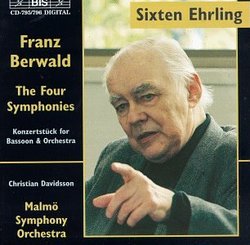Ehrling At His Best
Jeffrey Lipscomb | Sacramento, CA United States | 07/14/2004
(5 out of 5 stars)
"Berwald's father was a German violinist who immigrated to Sweden in the 1770's. Franz Berwald (1796-1868) was also a violinist who had a tough time gaining recognition as a composer - he spent much of his adult life earning his living in other pursuits. He owned an orthopedic institute in Berlin from about 1829 to 1841, married one of his employees and returned to Sweden, where he was passed over for the conductorship of the Royal Swedish Opera, and then spent many years managing a sawmill and glass works in the north of Sweden. He was finally appointed as professor of composition at the Stockholm Musical Academy in the last year of his life. His finest symphony - the "Singuliere" of 1845 - was never even performed until 1905.My first encounter with Berwald's music was via Ehrling's earlier recording (1965) of the Singuliere (#3, coupled with the #4 in E flat) on a London LP. I then picked up Ehrling's disc of #1 ("Serieuse," the only one of his symphonies that the composer ever heard played) - it is now on Bluebell CD 047 and is indispensable for its couplings: the overtures Estrella de Soria (1841) and Queen of Golconda (1864), and the tone poems The Bayadere Feast (1842), Memories from the Norwegian Alps (1842), and Fairy Dance (1841). I also picked up the #2 ("Capricieuse") on an RCA Victrola LP conducted by Antal Dorati (the original full score of #2 was lost and the work was re-constructed from the composer's sketches).This wonderful BIS set of the four symphonies completely supplants both Ehrling's earlier recordings of #1, 3 & 4 and the Dorati #2, as well as other complete sets from Jarvi, Goodman and Kamu. The sound here is superb: warm, detailed and spacious. I was initially apprehensive about the Malmo Symphony, but under Ehrling it plays like a world class ensemble (Ehrling was born in Malmo). Even the 4th's difficult last mvt. comes off brilliantly, if not quite the virtuoso affair that Markevitch's DG recording makes of it. But just as I prefer Furtwangler's Brahms to Toscanini's, I'll take Ehrling's Berwald over Markevitch's any day. In short, I feel this is THE set of Berwald's lovely symphonies. But be sure to supplement them with that Bluebell CD for Ehrling's superb renditions of the overtures and tone poems.The Konzertstuck for Bassoon and Orchestra is a short (11 minutes) and early work (1827): it seems to me rather remniscient of Schubert and Mendelssohn and is engagingly played. There was also an earlier symphony (1821) that survives only as a fragment - it's not very distinctive (Goodman's set includes it). It seems odd that Berwald wrote his 4 major symphonies in such a short period (1842-45) and then never returned to the genre in his remaining 23 years. But then, Sibelius composed his 7th Symphony in 1924 and never wrote another before his death in 1957. And just as Sibelius was Finland's greatest composer, Berwald was Sweden's finest symphonist."
The pinnacle
Mark McCue | Denver, CO USA | 08/09/2000
(5 out of 5 stars)
"I absolutely agree with Mr. Hurwitz that Ehrling is way upstairs from everyone else in the house in this material. Out here in Colorado we've had Ehrling as a fixture for so long that when push came to shove a few years back, the nearly-unknown Colorado Symphony that he made into a crystalline ensemble was really sorry to see him go.But good for Malmo, Ehrling is back home and he brings all the virtues of his art to their project here. In short, all four symphonies are given his characteristic drive, cleanly delineated sonic patterns, focus, light but clear and brilliant string tone and a solid, solid bass line that moves with equal clarity. Ehrling was never one for long movement breaks, and his headling approach in that comes across marvelously in the clear sound. Malmo could almost be considered Colorado SO's sister ensemble because of Ehrling's great podium presence.So with the Ehrling treatment, Berwald emerges as a brilliant mind for the first time. Contributions by Bjorlin, Montgomery, Salonen and Jarvi are not to be denied, but Ehrling has just that much extra zest and intellect in him to get the best of Berwald for us."
Strikingly original works by their greatest interpreter
chefdevergue | Spokane, WA United States | 04/16/2003
(5 out of 5 stars)
"It is simply a terrible shame that the symphonies of Berwald are not better known, for they are very much original works, in no way derivitave of the other music being composed at the time. Perhaps because Berwald spent good portions of his life in relative musical backwaters such as Stockholm. He also did not promote himself as aggressively as some of his contemporaries. As a result, his works have somewhat fallen into neglect.If not for Sixten Ehrling, we might not know these works at all. I first heard a battered recording of the 1st Symphony performed by Ehrling about 20 years ago, and was hooked on Berwald's music. I have other Berwald recordings by Järvi in my collection, and they are very good, but I still think Ehrling offers the best interpration of all.If you don't know Berwald's music, you need to listen to it! He is very much his own man, and his music is just delightful. You will wonder why these pieces are so seldomly performed."


 Track Listings (8) - Disc #1
Track Listings (8) - Disc #1